Key takeaways:
- Flexibility and adaptability are essential for managing project deadlines effectively and reducing stress.
- Breaking projects into smaller milestones fosters motivation and makes goals more achievable.
- Effective time management enhances productivity and reduces chaos, leading to smoother project execution.
- Open communication and regular check-ins within the team promote collaboration and trust during changes.
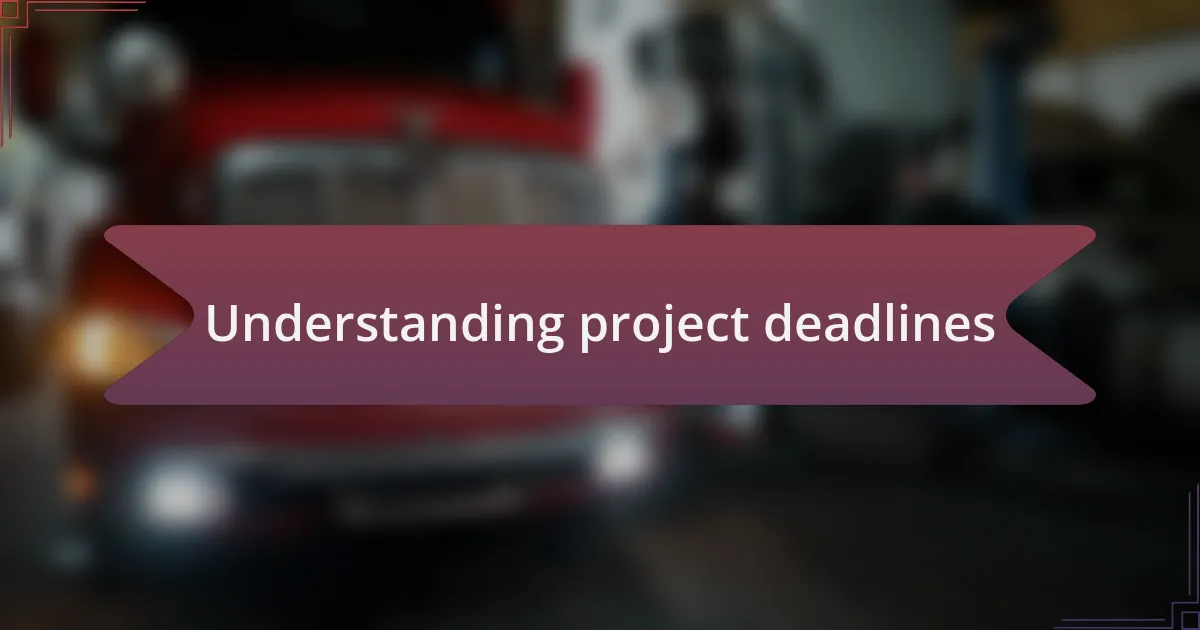
Understanding project deadlines
Understanding project deadlines goes beyond just the dates on a calendar; it’s about setting clear expectations for both yourself and your team. I remember a time when I underestimated a project timeline, thinking I could handle it all with a bit of hustle. The feeling of waking up at midnight, realizing I was behind schedule, is an emotion I never want to repeat. How do we avoid that panic?
As we dive into deadlines, it’s essential to appreciate the interplay between flexibility and accountability. I’ve found that while it’s critical to stick to deadlines, being adaptable can also be a game-changer. One project taught me that unexpected obstacles pop up, so allowing some buffer time can significantly reduce stress for everyone involved. How often do we stick rigidly to dates that no longer reflect reality?
Furthermore, project deadlines can be an opportunity for growth. I used to see them as pressure points, but I’ve shifted my view to see them as guiding lights. When I broke projects down into smaller milestones, it transformed the way I approached tasks. It was almost exhilarating to achieve those mini-goals. Have you ever experienced that boost of motivation from ticking off tasks before the final deadline?
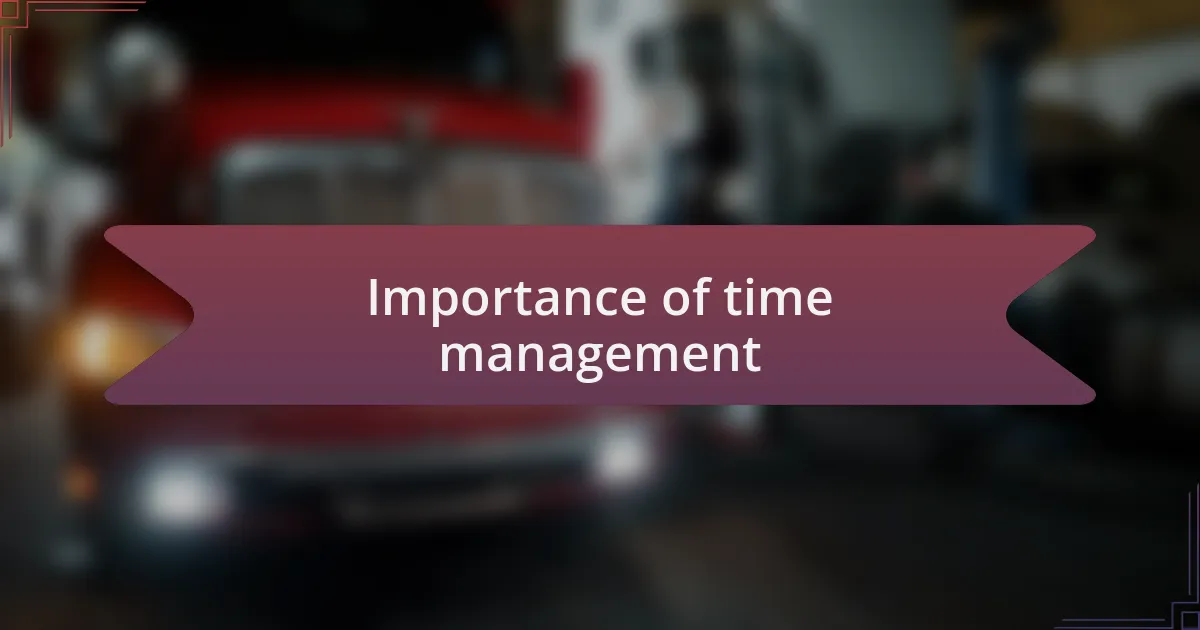
Importance of time management
Time management is the backbone of successful project execution. I once juggled multiple tasks and thought I could thrive on last-minute efforts, but I quickly realized that chaos breeds mistakes. Have you ever felt the weight of an impending deadline and wondered if there was a simpler way to stay organized?
By prioritizing time management, I learned to allocate resources more effectively and create realistic timelines. There was a specific project where I meticulously mapped out each phase, and the clarity it brought was incredible. I distinctly remember how much smoother the workflow became when everyone was on the same page—collaboration flourished, and tension diminished. Isn’t it rewarding when a clear plan aligns the entire team?
Additionally, mastering time management helps in reducing stress—an invaluable aspect in software development. I’ll never forget one particularly intense deadline where I was able to stay calm simply because I had prioritized my tasks correctly. Instead of feeling overwhelmed, I felt empowered, and that shift in mindset made all the difference. Have you had similar experiences where managing your time led to breakthroughs in your projects?
![]()
Tools for tracking progress
Tracking progress in software development is best accomplished with the right tools. I’ve often leaned on project management software like Trello and Jira, which provide fantastic visual boards that highlight task statuses. Have you ever used a Kanban board to see all your tasks laid out? The clarity those tools provide can be a game changer, making it easier to identify bottlenecks before they escalate into bigger issues.
While I appreciate robust software, I also value simplicity. I’ve found that using tools like Google Sheets for tracking progress offers the flexibility needed for lighter projects. It allows me to customize my tracking system completely, and I can even include coding milestones directly in the sheet. A quick glance tells me if I’m on track—or if I need to adjust my timeline.
I’ve also discovered that integrating time tracking tools, like Harvest or Clockify, can illuminate unexpected insights about where my hours are actually spent. The first time I analyzed my productivity through these metrics, I was shocked to see exactly how much time I had wasted on distractions. Tracking not just the progress, but also the time spent on each task has transformed how I approach deadlines. Have you ever measured your work habits like this? It’s enlightening!
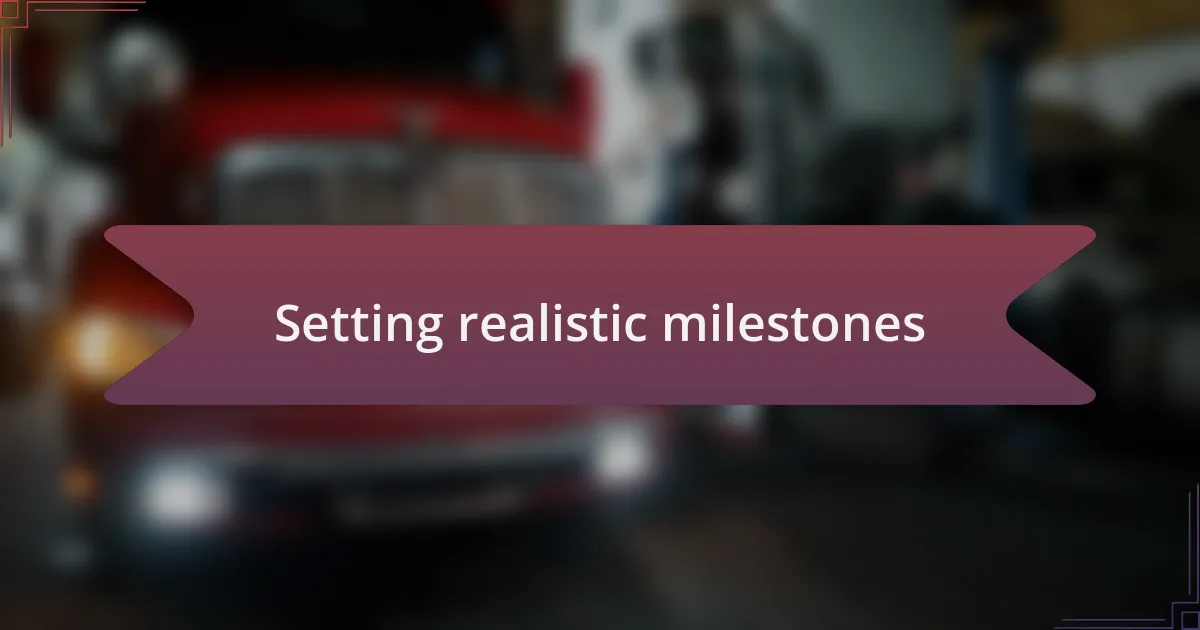
Setting realistic milestones
Setting realistic milestones is crucial for keeping projects on track. I remember a software project where I was overly ambitious with our timelines. Instead of planning for the unexpected, I had set milestones that simply weren’t achievable, leading to a wave of stress and rushed work as deadlines approached. Have you ever felt that pressure? It’s a tough spot to be in.
When I learned to break down projects into smaller, manageable milestones, everything changed. I began to factor in potential challenges and team member availabilities. This practice not only provided clarity but also fostered a sense of accomplishment as we hit each target. Seeing the team celebrate these small victories was truly motivating; it made the larger goal feel reachable.
Another key insight I’ve gathered is the value of flexibility. Sometimes, despite our best planning, things change. A client may shift priorities or an unexpected technical hurdle may arise. I’ve learned to reassess milestones regularly and adapt the timeline when needed. This approach keeps the momentum going and allows the team to feel more secure, knowing they are not tied to an unrealistic plan. How do you handle changes to your milestones? For me, it’s about communication and collaborative problem-solving.
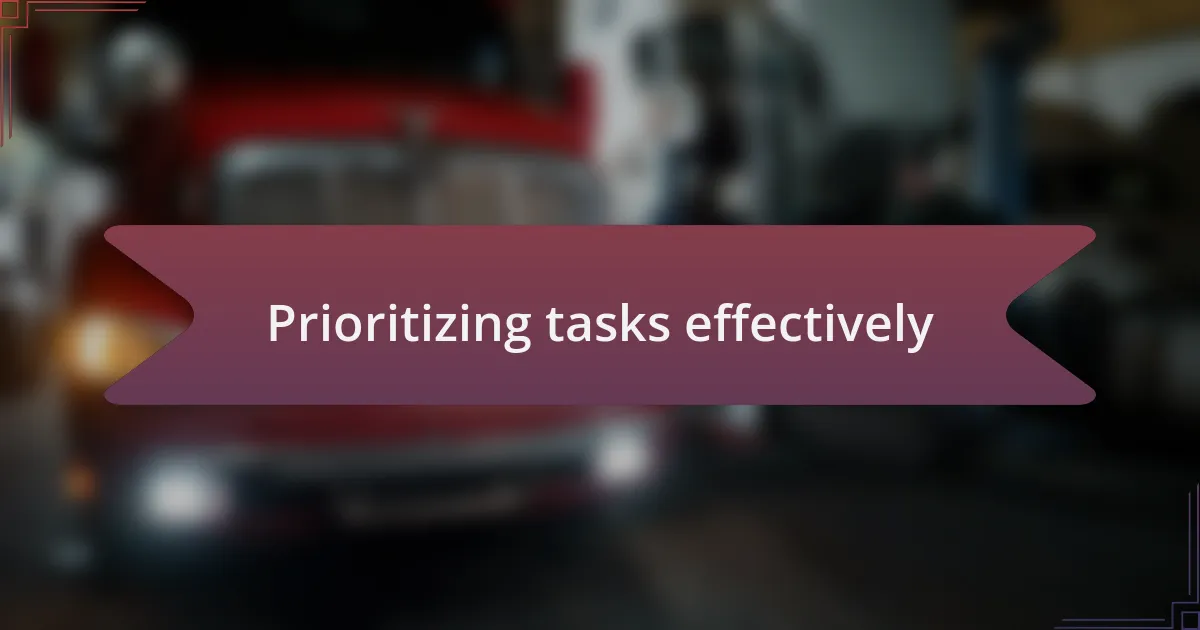
Prioritizing tasks effectively
When it comes to prioritizing tasks effectively, I find that the Eisenhower Matrix is a game-changer. This simple tool helps me distinguish between what’s urgent and what’s important. Have you ever had that nagging feeling that you’re busy but not necessarily productive? By categorizing tasks into four quadrants, I can focus on what truly impacts project outcomes rather than just firefighting daily demands.
In my experience, I often encounter the challenge of balancing various tasks with different stakeholders’ expectations. For instance, during a project where feature requests were flying in from multiple directions, I learned to hold a prioritization meeting with my team. By involving everyone in the discussion, we collectively agreed on priorities, which reduced stress and fostered a supportive environment. I’ve seen how empowering my team to voice their opinions not only clarifies priorities but also builds trust.
I always remind myself that effective prioritization isn’t just about the list—it’s about understanding the broader context. Sometimes, I ask myself, “What will move the needle for this project?” Reflecting on that question has led me to sometimes deprioritize tasks I thought were crucial. This mindset shift has helped me allocate my time and resources more wisely, and the team has witnessed tangible progress as a result. Have you found that asking the right questions can reshape your approach? For me, it’s a transformative insight.
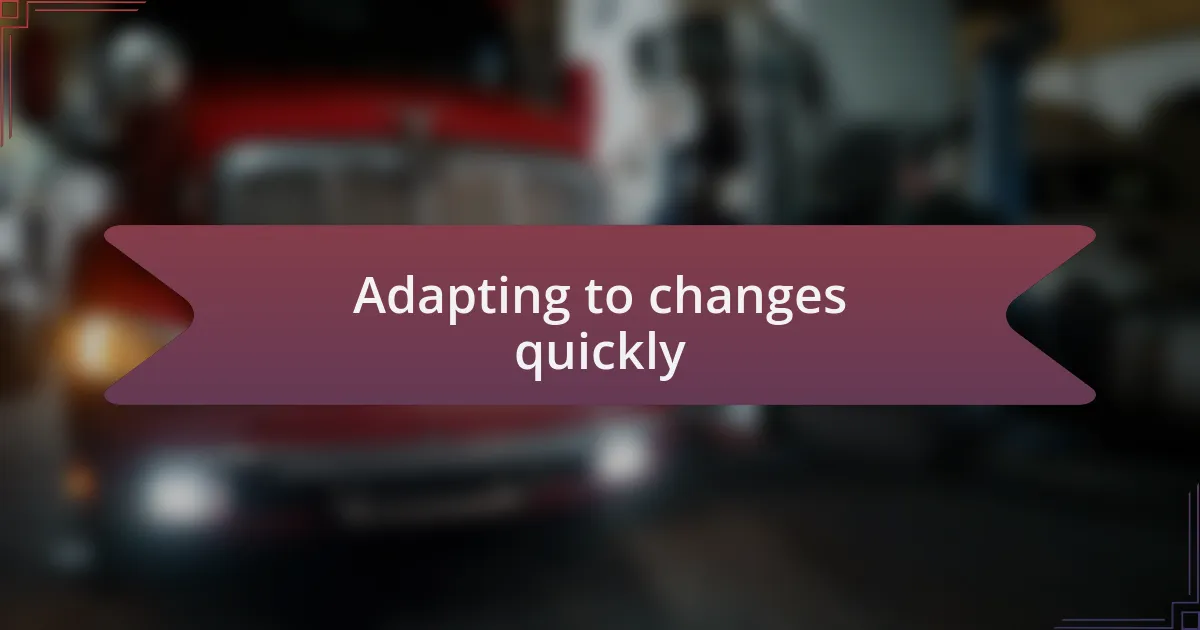
Adapting to changes quickly
Adapting to changes isn’t just a skill; it’s a mindset I continuously nurture. There was a pivotal moment in a project where a sudden shift in client requirements meant I had to pivot my entire team’s focus overnight. It was a bit chaotic at first, but I encouraged open communication. I asked, “How can we turn this unexpected challenge into an opportunity?” That question sparked creative solutions we hadn’t considered previously.
It’s essential to remain flexible and open to new ideas when faced with change. When I lead a team, I often remind them that our first response shouldn’t be frustration but curiosity. Reflecting on a time when I had to reallocate resources mid-project taught me the importance of having a plan B—or even plans C and D. Embracing adaptability not only keeps the momentum going but strengthens the team’s resilience.
I’ve found that maintaining a positive attitude during transitions greatly influences the team’s overall morale. I often check in with my colleagues and ask them how they feel about the changes we’re facing. From personal experience, I’ve seen that those who feel heard are more willing to embrace uncertainty and collaborate. Adapting swiftly isn’t just about altering schedules; it’s about nurturing a culture that thrives on innovation and support. How do you ensure your team stays motivated during shifts? For me, those check-ins have been invaluable.
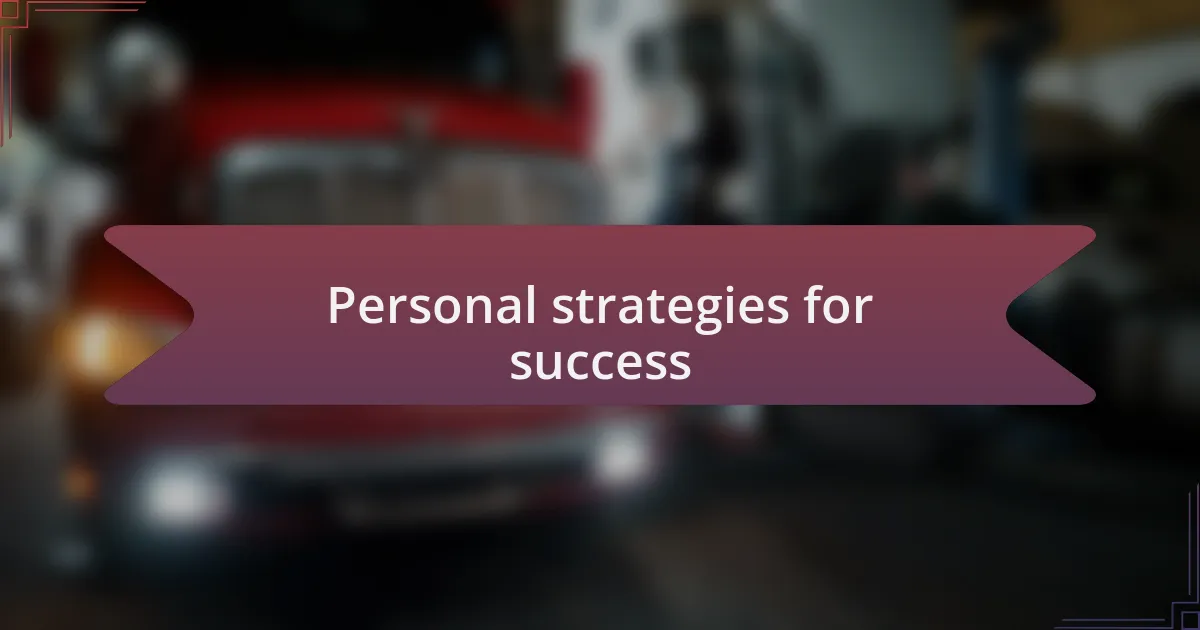
Personal strategies for success
I focus on setting clear expectations right from the outset of a project. One time, I laid out a timeline with key deliverables for my team, but I also included buffer times for unexpected hurdles. I knew from experience that recognizing potential obstacles can ease the pressure when things go awry. Have you ever felt the anxiety of tight deadlines? Making time for contingencies allowed us to manage our workload more effectively and reduced stress all around.
To keep myself and my team aligned, I prioritize regular check-ins. In my previous role, I initiated brief stand-up meetings every morning. These gatherings kept everyone accountable and fostered a sense of camaraderie. I often think, what if we didn’t meet daily? The disconnection could lead to misunderstandings or missed opportunities, overshadowing our progress. I cherish those moments of teamwork that bring us together, driving us all in the same direction.
Finding a balance between work and personal life is crucial for sustained productivity. I recall a time when I worked late hours to meet a deadline, only to realize I was burning out. Now, I make it a point to schedule breaks and downtime, recognizing that recharging is vital for creativity. How do you recharge? For me, stepping away from the screen often leads to my best ideas. Prioritizing self-care empowers me to tackle deadlines with renewed energy and focus.